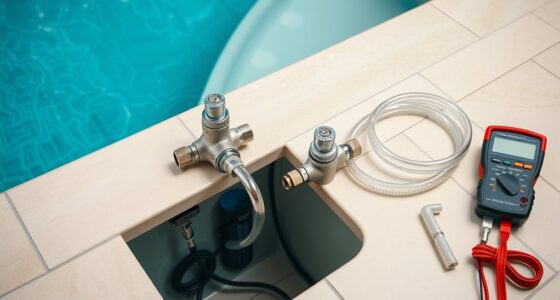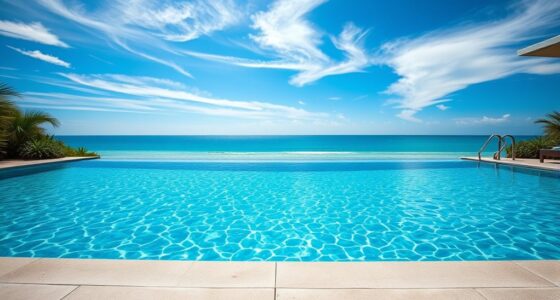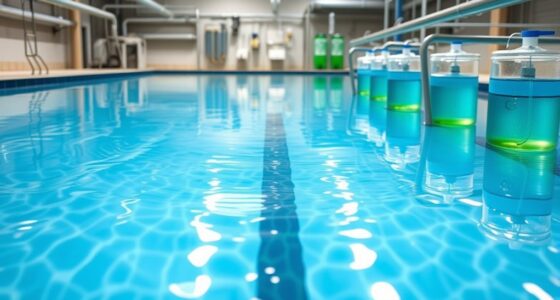Endless pools can produce sounds and vibrations that vary based on their model, installation, and maintenance, but they generally range from quiet hums to moderate noise levels. Factors like pump and jet design, placement on solid surfaces, and surrounding structures influence how loud they get. Proper soundproofing, regular maintenance, and strategic placement can markedly reduce noise. Keep exploring to discover tips on keeping your pool area peaceful and prolonging equipment life.
Key Takeaways
- Endless Pools vary in noise levels depending on motor size, design, and installation, typically producing humming or gentle water sounds.
- Proper placement on solid, level surfaces and away from living areas helps minimize sound transmission and vibrations.
- Noise can increase with high-speed water jets, filters, or worn components, making regular maintenance essential.
- Installing soundproofing measures like acoustic panels or insulation around the pool can significantly reduce noise and vibrations.
- Using vibration isolation and ensuring tight, well-maintained fittings helps keep the pool operation quieter and prolongs equipment life.
Factors Influencing Noise Levels in Endless Pools
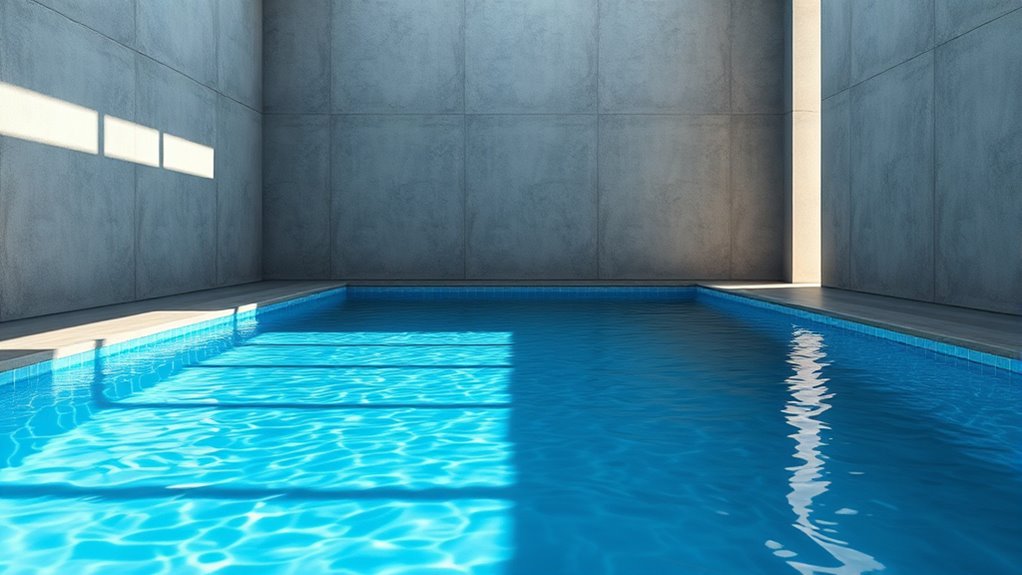
Several factors can influence the noise levels in your Endless Pool, and understanding them can help you create a quieter environment. The pump’s design and power markedly affect sound output; a quieter, energy-efficient model produces less noise. The pool’s installation location also matters; placing it on a solid, level surface reduces vibrations that can amplify sound. The surrounding environment, including nearby equipment or structural elements, can reflect or absorb sound waves, impacting overall noise levels. Water temperature and filter operation contribute as well—high-speed filters and heated water tend to generate more noise. Additionally, the pool’s maintenance condition influences noise; debris buildup or worn components can cause irregular sounds. Being mindful of these factors allows you to optimize your setup for a more peaceful swimming experience. Proper soundproofing techniques can further minimize noise transmission from your pool area.
Common Sources of Sound and Vibrations
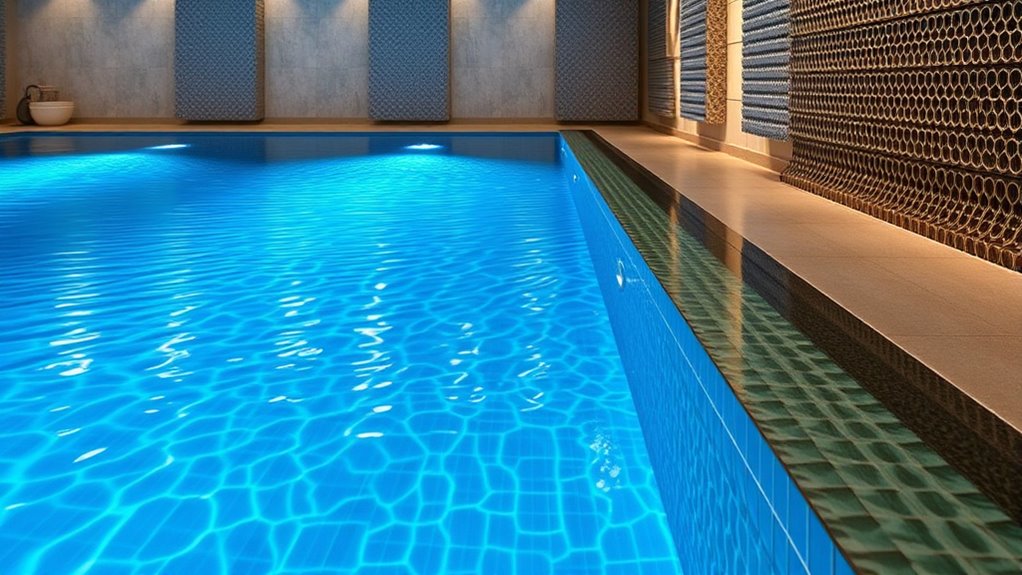
Understanding the main sources of sound and vibrations in your Endless Pool can help you identify and reduce unwanted noise. The pump is usually the loudest component, creating humming or buzzing sounds during operation. Jets can also produce noise, especially if they’re set to high flow rates, causing water turbulence and vibration. The filter system adds noise through motor operation and water flow. Structural vibrations originate from the motor or pump, transmitting through the pool shell and surrounding surfaces. Additionally, water movement itself generates sound, from splashing to rippling. Mechanical parts, such as valves and fittings, can produce clicking or rattling sounds if loose or worn. Recognizing these common sources allows you to pinpoint where noise originates and take targeted steps to minimize vibrations and sound. Vetted – Flat Iron Bike products can provide insights into noise reduction strategies for various mechanical systems.
Comparing Noise Output Among Different Models
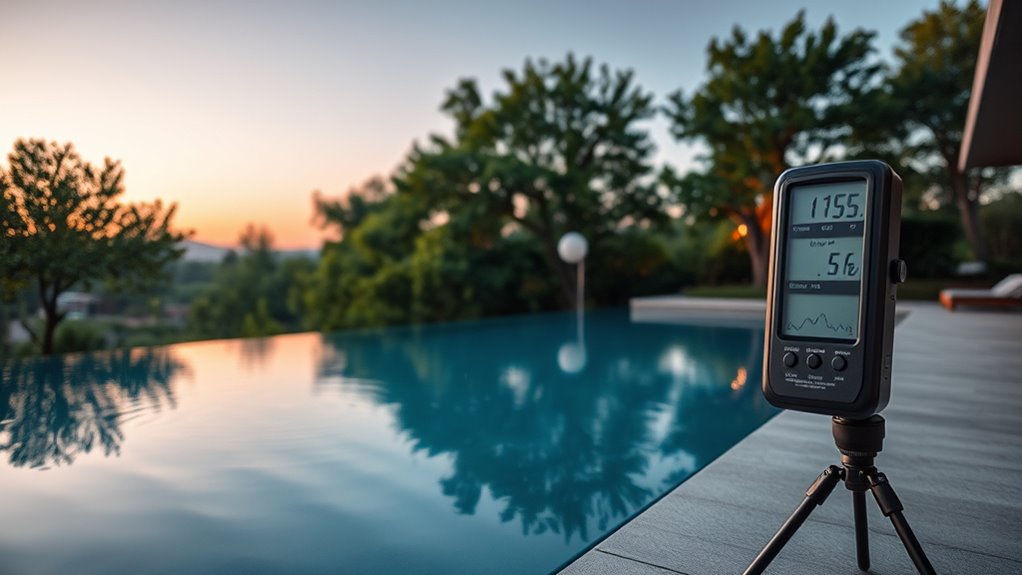
Different Endless Pool models vary markedly in their noise output, influenced by design, motor type, and features. Some models have quieter, energy-efficient motors that produce minimal sound during operation, ideal for indoor use or early mornings. Others feature more powerful motors, which may generate louder noise levels, especially at higher speeds. The construction quality and soundproofing materials also play a role in dampening noise. For example, models with advanced vibration isolation tend to be quieter overall. Additionally, features like variable-speed pumps can affect noise levels, with smoother operation producing less sound. When comparing models, pay attention to manufacturer specifications and user reviews on noise performance, ensuring you select a pool that aligns with your comfort and noise sensitivity needs. Understanding vibration dampening can help you choose a quieter model.
Impact of Installation and Location
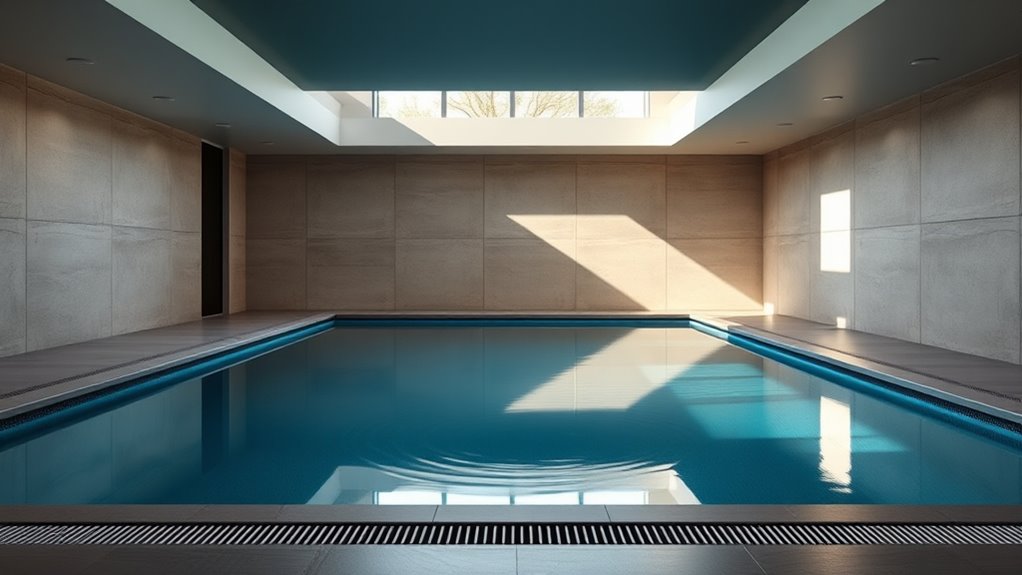
The way you install and position your Endless Pool considerably influences the noise you hear during operation. Proper placement can reduce vibrations and sound transmission. Consider these key factors: 1. Choose a Room with Solid Flooring: Hard, concrete floors absorb less noise than wooden or unstable surfaces. 2. Avoid Shared Walls or Thin Partitions: Placing your pool in a space separated from bedrooms or quiet areas prevents noise from disturbing others. 3. Position Away from Living Spaces: Keep the pool in a corner or basement where vibrations and sound are less likely to travel through walls or floors. Additionally, selecting a home theater projector with soundproofing features can help minimize noise transmission and improve your overall experience.
Practical Tips for Soundproofing Your Pool Area

To reduce noise from your pool, start with effective insulation techniques that block sound transmission. Using sound-absorbing materials like foam panels or acoustic tiles can make a noticeable difference. Implementing these strategies helps create a quieter, more peaceful pool environment. Additionally, considering comfort solutions for pool areas can enhance overall relaxation and enjoyment.
Insulation Techniques for Pools
If you want to reduce pool noise effectively, focusing on insulation is essential. Proper insulation helps dampen vibrations and block sound from escaping your pool area. Start by installing acoustic panels or foam insulation around the pool’s perimeter to absorb sound waves. Next, consider insulating the pool walls and floor with materials like spray foam or rigid foam boards, which can prevent vibrations from transmitting through the structure. Lastly, seal gaps and cracks with weatherstripping or acoustic sealant to prevent sound leaks. Incorporating portable camping toilets in the pool area can also help contain noise and odors, enhancing the overall soundproofing strategy.
Here are three key insulation tips:
- Use high-density foam panels around the pool’s perimeter.
- Insulate walls and floors with spray or rigid foam insulation.
- Seal all gaps and cracks with acoustic sealant.
These steps considerably enhance soundproofing and minimize noise disturbance.
Sound Absorbing Materials
Using sound absorbing materials is one of the most effective ways to minimize noise around your pool area. These materials help reduce echo and dampen vibrations, making your space quieter and more comfortable. Consider installing acoustic panels or foam tiles on walls and ceilings to absorb sound waves. Carpeting or rubber mats on the floor can also considerably cut down on noise reflection. Additionally, hanging fabric curtains or using outdoor sound barriers can help contain sound within the pool zone. Be strategic about placement—focus on reflective surfaces and areas where noise bounces most. Incorporating soundproofing techniques such as sealing gaps and adding insulation can further enhance overall soundproofing. Combining these materials with insulation techniques enhances overall soundproofing. With the right sound absorbing materials, you’ll enjoy a quieter pool experience and less disturbance to your surroundings.
Maintenance and Its Effect on Noise
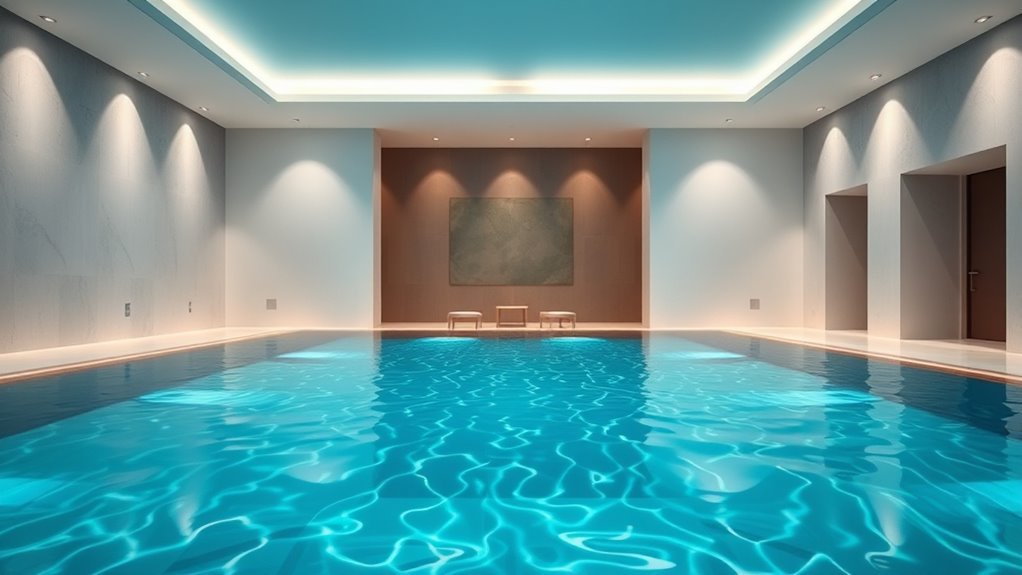
Regular maintenance plays a crucial role in controlling the noise levels of your Endless Pool. When you keep everything in top shape, you reduce vibrations and mechanical sounds that can increase noise. To guarantee maximum performance, focus on these three key areas:
- Inspect and tighten all bolts and fittings to prevent rattling sounds caused by loose parts.
- Clean and lubricate the pump and motor regularly to minimize friction and vibration noise.
- Replace worn-out or damaged components promptly to avoid excessive mechanical noise and ensure smooth operation.
- Beneficial ingredients like collagen and hyaluronic acid in eye patches contribute to anti-aging effects and overall skin appearance.
Monitoring and Managing Noise Over Time
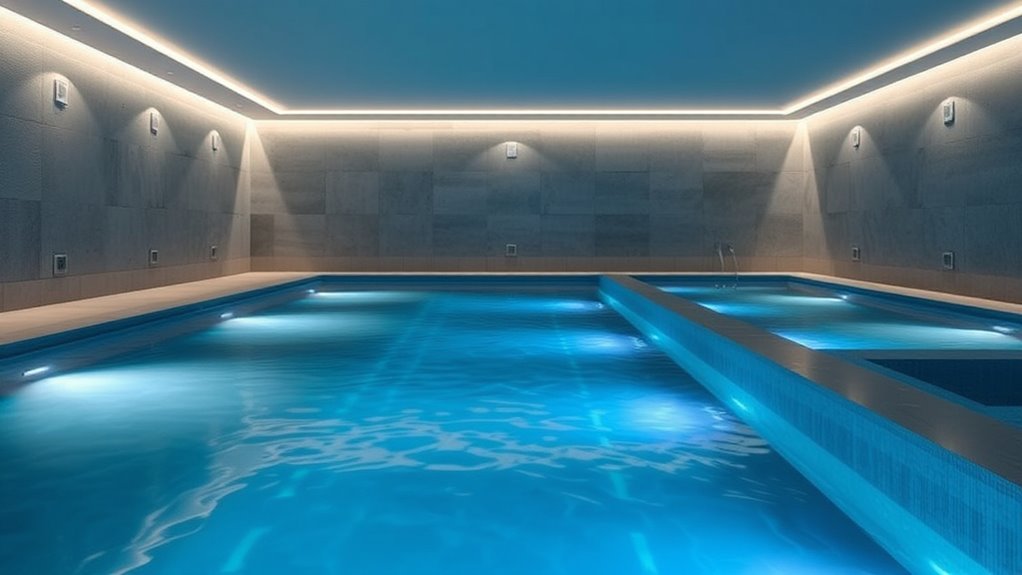
Monitoring and managing noise over time guarantees your Endless Pool remains quiet and efficient. Regularly listen for unusual sounds or increased vibrations that could indicate mechanical issues or wear. Keep a noise log to track patterns and identify disturbances early. Use a decibel meter to measure sound levels periodically, ensuring they stay within acceptable limits. If you notice a rise in noise, address it promptly—tighten loose components, clean filters, or consult a professional if needed. Consistent upkeep helps prevent minor issues from escalating. Adjust your pool’s equipment settings if noise levels fluctuate, and consider soundproofing enhancements if needed. Staying proactive ensures your pool stays quiet, energy-efficient, and enjoyable, while also extending its lifespan. Proper maintenance practices can further help in identifying potential problems before they become severe.
Frequently Asked Questions
Can the Noise From an Endless Pool Disturb Neighbors?
Yes, the noise from your endless pool can disturb neighbors if it’s loud enough or if they’re nearby. To prevent issues, you can install soundproofing measures like insulation, barriers, or mats to absorb vibrations and reduce noise. Keep the pool’s equipment well-maintained and set it to quieter modes if possible. Being considerate and proactive helps maintain good neighborly relations while enjoying your pool.
Are There Specific Models Known for Quieter Operation?
Yes, some models are known for their whisper-quiet operation, letting you enjoy your swim without much fuss. Look for pools with advanced soundproofing features and quieter pump technology, like those with variable-speed pumps designed to reduce noise. Brands such as Endless Pools and SwimEx often prioritize quieter performance, making your swim experience more peaceful. Choosing these models helps keep the ambiance serene and neighbor-friendly, so you enjoy your pool in harmony.
How Does Water Temperature Affect Noise Levels?
You’ll notice that warmer water tends to be quieter because it reduces the viscosity of the water, allowing the pump and jets to operate more smoothly. Cooler water increases viscosity, which can cause the pump to work harder and generate more noise. To minimize noise levels, maintain a consistent, comfortable temperature, and consider insulating the pool and equipment to dampen vibrations and sound. Proper maintenance also helps keep noise levels down.
Does Usage Frequency Influence Noise Emissions?
Using your endless pool more often can increase noise emissions, with some users noticing a 15% rise in sound levels after daily use. When you frequently operate the system, the pump and motor work harder, producing more vibrations and noise. To keep sound levels manageable, consider installing soundproofing measures or spacing out usage. Regular maintenance also helps minimize noise, ensuring your pool remains a peaceful retreat.
Are There Legal Noise Restrictions for Backyard Pools?
Yes, there are legal noise restrictions for backyard pools that you should follow. Local ordinances often set limits on noise levels, especially during nighttime hours, to prevent disturbances. You’re responsible for ensuring your pool’s noise doesn’t violate these rules. Check your city or county regulations to stay compliant, and consider soundproofing or limiting use during quiet hours to avoid fines or complaints from neighbors.
Conclusion
By taking these soundproofing tips seriously, you’ll turn your endless pool area into a tranquil oasis, silencing even the loudest splashes and roaring pumps. No more waking up the whole neighborhood or feeling like you’re in a noisy waterpark—your pool will be so quiet, it’ll be as peaceful as a whispering breeze. With the right measures, you’ll make your pool the ultimate sanctuary, where calm and serenity flow endlessly.




